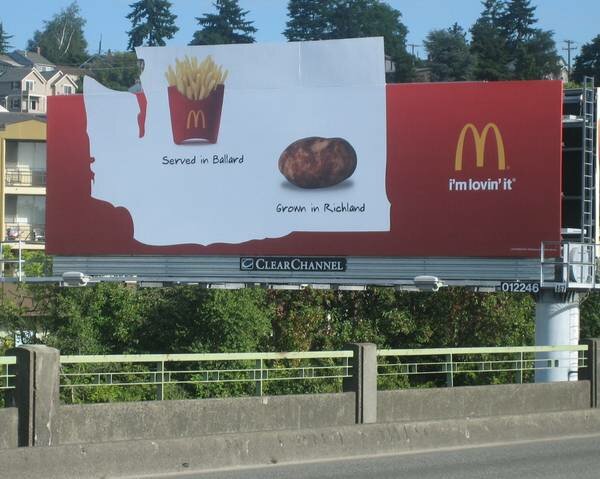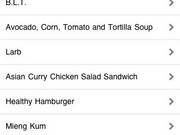 Photo courtesy of Gilman Park blog.
Photo courtesy of Gilman Park blog.
Coincidentally, I happen to be reading Mark Bittman's screed against agribusiness, junk food, and fast food, Food Matters, just as McDonald's "localwashing" ad campaign splashes across Seattle billboards. Gilman Park blog apparently broke the story on July 18, and it is now spreading across the internet. See Grist.com, Change.org, Fast Company, and Web Design Cool for various takes on the fast food giant's blatant and insulting attempt to hitch a ride on the locavore wagon.
The irony of the campaign is that a marketplace such as Seattle, with strong farmers markets, restaurants committed to sourcing locally, and an educated, informed populace, is not likely to respond well. That doesn't really matter. McDonald's has a marketing budget of over a billion dollars, the bulk of which (over $800 million, as of 2006) is spent on U.S. media. That's about 16 percent of gross sales, paid for with every Big Mac, fries, and shake. Test marketing an ad campaign that will be about as successful as their pizza trial a few years ago is just a part of the equation.
What will be significant is the how much media attention the campaign gets, whether the campaign becomes a "teaching moment" for consumers in other markets, and whether other communities heed the warning: Localwashing appears to be the next frontier for advertising. It's certainly easier and cheaper than actually sourcing and using local, sustainable, and organic ingredients. Very, very low hanging fruit for McDonald's, in fact, since the company is the single largest purchaser of beef, pork, potatoes, and apples in the U.S....
It's tech day on The SunBreak, I guess. I've been wanting to write about Locavore, the Seattle-grown iPhone app, for some time, and their recent update announcement just gave me a reason to. (Full disclosure: I have been at parties at the same time as Buster Benson.)
Locavore responds to the notion that eating locally grown food is not just better for your green self-esteem, it's better for local farmers, the environment, and food quality. Plenty of people value locally grown food over an organically grown label, although you often aren't called upon to make that choice around Seattle. (Of course, there are trade-offs.)
The $2.99 app identifies your location in the U.S. and then tells you what's in season where you live. (It also tells you what's coming into season, and what's going out.) It also gives you a list of local farmer's markets and farms, with a description of what the market is like, and tells you how to get there. If you're into the whole social media thing, you can also announce your local eating...





Most Recent Comments